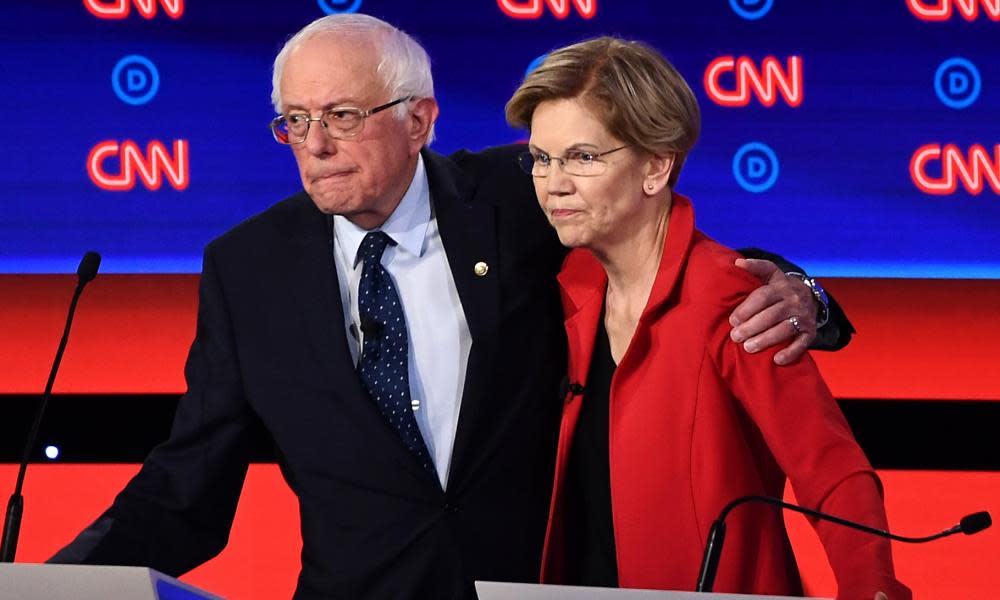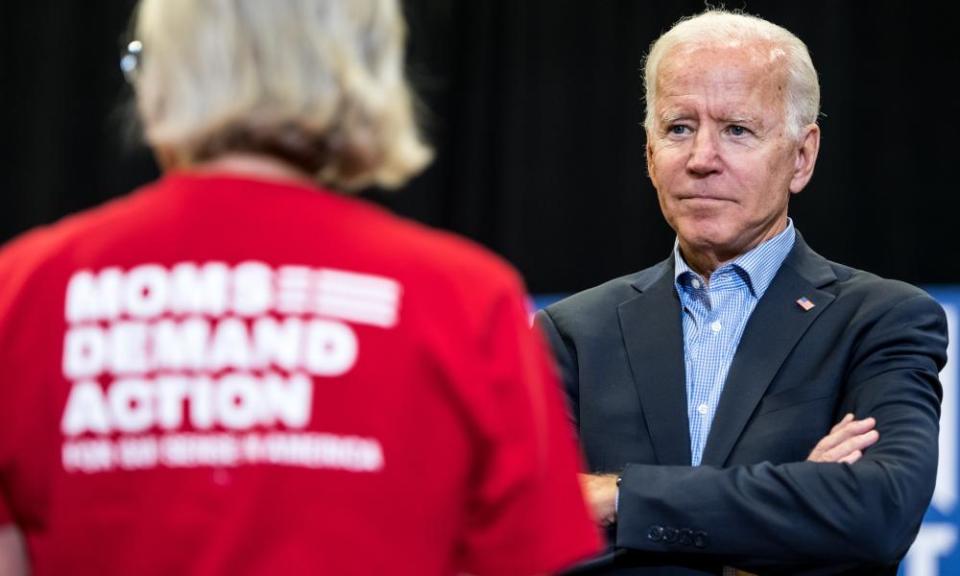How Warren surged past Sanders – and how he fought back

Among the what ifs and what might have beens of politics in America there is Ready for Warren, a group that urged Elizabeth Warren to run for president in 2016.
Related: Washington's great mystery: Trump’s affinity for Putin and populists baffles experts
“If I’m being quite frank, I’m upset that she didn’t and haven’t really forgiven her,” said Dave Handy, a political organiser who was part of that effort. “We could have avoided a lot of trouble if she had just had the courage to run.”
Handy threw in his lot with Bernie Sanders instead. “Even though progressives like myself begged her, Liz refused to run and this whole apparatus that Bernie now has – that I’m a part of and many progressives and now many democratic socialists are a part of – could have been hers. And we could have avoided the whole ‘Bernie bro’ myth that’s been carved out.”
Activists such as Handy illustrate divided loyalties and an exquisite dilemma for progressives as Democrats choose their nominee to take on Donald Trump in 2020. Polls show Sanders and Warren running almost neck and neck behind the centrist Joe Biden, begging the question: to avoid splitting the vote, should one drop out and endorse the other?
With both candidates drawing bigger crowds than a former vice-president who seems increasingly gaffe-prone and vulnerable, there is no sign of it happening any time soon. Indeed, some on the left believe Sanders and Warren are poised to push Biden into third and go head to head.
Warren and Bernie have been dominating the debate; I feel like the Biden campaign is very much on the defensive
Charles Chamberlain
Cenk Uygur, host and founder of the online news show The Young Turks, wrote in the Washington Post this week: “While Warren and Sanders draw thousands, his audiences are far smaller. His campaign is gasping for breath, and we’re only in August. The Biden fade has begun. I’m not sure he will even be in the race by Iowa.”
Uygur added: “This race now isn’t between Warren and Biden; it’s between Warren and Sanders. And for progressives, that’s a dream come true.”
‘Elizabeth Warren Is Completely Serious’
Sanders, a senator from Vermont who at 77 is the oldest candidate in the field, no longer has the element of surprise he enjoyed against Hillary Clinton in 2016. He continues to promise free tuition at public universities, a $15-an-hour minimum wage and universal healthcare. He still has a peerless network of small-dollar donors and continues to generate enthusiasm at rallies.
Warren, a 70-year-old senator from Massachusetts and longtime critic of Wall Street, has enjoyed a slow but inexorable surge. She has promised to “fight” – one of her favourite words – a rigged system and has released detailed policy proposals on everything from breaking up tech companies to implementing a “wealth tax” on the rich.
Her populist economic message has struck a chord, drawing big crowds – 15,000 in Seattle; 12,000 in St Paul, Minnesota – and positive media buzz. “The Very Real Possibility of President Elizabeth Warren” was Rolling Stone’s headline; “Slowly and Persistently, Elizabeth Warren Is On the Rise” declared New York magazine; “Elizabeth Warren Is Completely Serious” trumpeted a profile in the New York Times.
Charles Chamberlain, chair of the progressive group Democracy for America, said: “She’s the big winner of the last eight months. We’ve seen her steadily climb among our members. It’s a well run, well executed campaign, clearly engaging with voters. But Bernie Sanders has also been campaigning hard – it’s been ‘steady as she goes’.
“Warren and Bernie have been dominating the debate; I feel like the Biden campaign is very much on the defensive when it comes to policy. The rallies for Biden are eerily reminiscent of the lacklustre campaign of Hillary Clinton. Warren and Bernie are going to event after event and just getting bigger.”

Chamberlain shares the view that Biden will fade.
“I think this is going to come down to a Democratic primary with Warren and Bernie at the top,” he said. “Neither should drop out. They need to fight this to the end, even if that means going to a convention where deals have to be made.”
Who would win such a fight remains a matter of conjecture. Sanders won his first national union endorsement this week from the 35,000-member United Electrical, Radio and Machine Workers of America. But most unions remain on the fence.
Liberal groups are also split. In June Warren led a MoveOn survey with the support of 38% of members, followed by Sanders with 17%. In July, Sanders topped a Democracy for America poll with 32%, followed by Warren on 26%. In both cases, Warren had gained ground.
Indeed, she has gathered momentum nationally, overcoming controversy about her dubious claims of Native American ancestry, while Sanders has arguably hit a ceiling. There is a perception, at least, that she is gaining at his expense.
Michael Steele, a former Republican National Committee chair now a political analyst for the MSNBC network, said: “You’ve seen, in the rise of Elizabeth Warren, the Bernie Sanders voter falling off of Bernie, finding a better, younger fort to to dock their ship to, if you will. They don’t think that they are losing a step with Elizabeth; in fact, they are probably gaining a few more steps because she checked a number of other boxes for them – in terms of being a woman, for example.
If both campaigns feel that they have traction, you won’t have an incentive there for either one of them to drop out
John Zogby
“We’ve seen that in the numbers, how she’s eclipsed him and now passed him in the polling, where in some polls she’s a lot closer to Joe Biden than Bernie was in the past.”
This week Senator Kirsten Gillibrand of New York became the sixth Democrat to drop out of the race since July. Steele does not expect Sanders or Warren to throw in the towel any time soon.
“If both campaigns feel that they have traction and they’re polling relatively close to each other, you won’t have an incentive there for either one of them to drop out. They’re both raising money, they’re both organising on the ground.
“I think they’re going to be fairly competitive with each other until one separates clearly from the other. That has not happened yet. If I’m Elizabeth Warren, I’m not going to cede that ground to Bernie Sanders, and if I’m Bernie Sanders I’m certainly not going to cede ground to her that I established going back to 2016.”
‘Bearer of the torch’
Imagined as a Venn diagram, there is common ground between Warren and Sanders voters but each has their own distinct base. A survey by the Pew Research Center this month found that about seven in 10 of Warren’s supporters are white, compared to about half of Sanders’ backers. Warren’s supporters are substantially more likely to have a college degree compared with supporters of Biden and Sanders.
John Zogby, a pollster and author, said: “Because of progressive ideology there is some sort of overlap, but they are different. Warren picks up support among women that ordinarily Sanders would not get, including former Clinton supporters who regard her as the bearer of the torch to get a woman elected.
“To assume that if one drops out, he or she would back the other is too facile. If Warren dropped out, she would probably consider that she had some leverage in the mainstream of the party and a chance to run again in the future, so would most likely endorse a mainstream figure like Biden.”
The senators have differences in style and substance. Warren embraces the term “capitalist” and is seen by some as less disruptive to corporate interests; Sanders characterises himself as a “democratic socialist” and offers fewer policy specifics. Warren refused to appear on Fox News; Sanders held a town hall on the network. Warren has just taken her 50,000th campaign selfie with supporters who wait in long lines; Sanders retains a curmudgeonly persona and showed little appetite for small talk at the recent Iowa state fair.
But when the duo, who remain fast friends, appeared together in the second debate in Detroit, distinctions appeared insignificant as they joined forces to fend off centrists on their support of policies such as Medicare for All, which would extend the existing government-run health insurance programme to all Americans, largely eliminating a role for private insurance.
Related: Trouble in paradise: Trump attacks Fox News – and Fox News hits back
In the end, however, even if the progressive dream comes true, there is bound to be disappointment and compromise for someone. Handy, 31, the former Ready for Warren activist, said: “In terms of the entire political spectrum, I would much prefer a Warren administration to a [Kamala] Harris administration or a second term of Trump. But that said, it just won’t go far enough.
“What this country needs now more than ever is what we had post-world war two with the building of the American middle class and FDR’s incredible social reform. That is what a Sanders administration will do, and my fear is that a Warren administration will not go far enough in addressing income inequality, in addressing criminal justice reform, in addressing our climate, in addressing all of these problems.”

